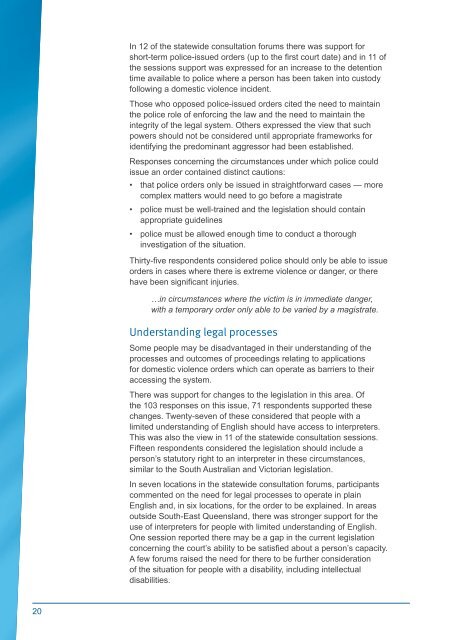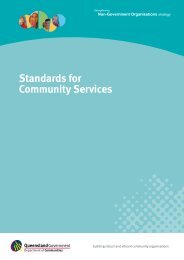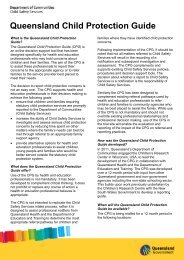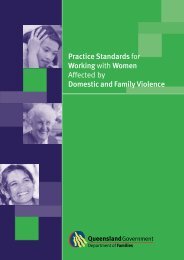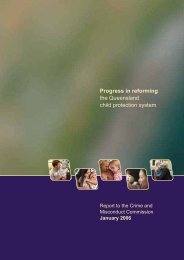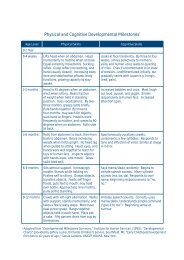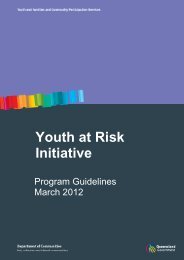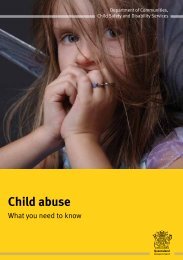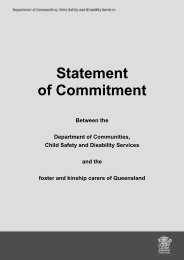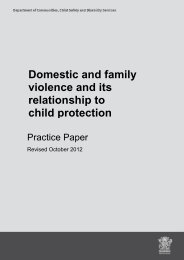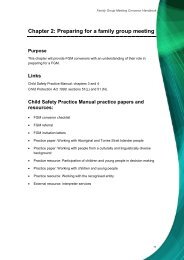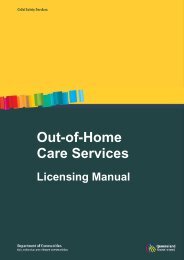Review of the Domestic and Family Violence Protection Act 1989 ...
Review of the Domestic and Family Violence Protection Act 1989 ...
Review of the Domestic and Family Violence Protection Act 1989 ...
Create successful ePaper yourself
Turn your PDF publications into a flip-book with our unique Google optimized e-Paper software.
In 12 <strong>of</strong> <strong>the</strong> statewide consultation forums <strong>the</strong>re was support for<br />
short-term police-issued orders (up to <strong>the</strong> first court date) <strong>and</strong> in 11 <strong>of</strong><br />
<strong>the</strong> sessions support was expressed for an increase to <strong>the</strong> detention<br />
time available to police where a person has been taken into custody<br />
following a domestic violence incident.<br />
Those who opposed police-issued orders cited <strong>the</strong> need to maintain<br />
<strong>the</strong> police role <strong>of</strong> enforcing <strong>the</strong> law <strong>and</strong> <strong>the</strong> need to maintain <strong>the</strong><br />
integrity <strong>of</strong> <strong>the</strong> legal system. O<strong>the</strong>rs expressed <strong>the</strong> view that such<br />
powers should not be considered until appropriate frameworks for<br />
identifying <strong>the</strong> predominant aggressor had been established.<br />
Responses concerning <strong>the</strong> circumstances under which police could<br />
issue an order contained distinct cautions:<br />
• that police orders only be issued in straightforward cases — more<br />
complex matters would need to go before a magistrate<br />
• police must be well-trained <strong>and</strong> <strong>the</strong> legislation should contain<br />
appropriate guidelines<br />
• police must be allowed enough time to conduct a thorough<br />
investigation <strong>of</strong> <strong>the</strong> situation.<br />
Thirty-five respondents considered police should only be able to issue<br />
orders in cases where <strong>the</strong>re is extreme violence or danger, or <strong>the</strong>re<br />
have been significant injuries.<br />
…in circumstances where <strong>the</strong> victim is in immediate danger,<br />
with a temporary order only able to be varied by a magistrate.<br />
Underst<strong>and</strong>ing legal processes<br />
Some people may be disadvantaged in <strong>the</strong>ir underst<strong>and</strong>ing <strong>of</strong> <strong>the</strong><br />
processes <strong>and</strong> outcomes <strong>of</strong> proceedings relating to applications<br />
for domestic violence orders which can operate as barriers to <strong>the</strong>ir<br />
accessing <strong>the</strong> system.<br />
There was support for changes to <strong>the</strong> legislation in this area. Of<br />
<strong>the</strong> 103 responses on this issue, 71 respondents supported <strong>the</strong>se<br />
changes. Twenty-seven <strong>of</strong> <strong>the</strong>se considered that people with a<br />
limited underst<strong>and</strong>ing <strong>of</strong> English should have access to interpreters.<br />
This was also <strong>the</strong> view in 11 <strong>of</strong> <strong>the</strong> statewide consultation sessions.<br />
Fifteen respondents considered <strong>the</strong> legislation should include a<br />
person’s statutory right to an interpreter in <strong>the</strong>se circumstances,<br />
similar to <strong>the</strong> South Australian <strong>and</strong> Victorian legislation.<br />
In seven locations in <strong>the</strong> statewide consultation forums, participants<br />
commented on <strong>the</strong> need for legal processes to operate in plain<br />
English <strong>and</strong>, in six locations, for <strong>the</strong> order to be explained. In areas<br />
outside South-East Queensl<strong>and</strong>, <strong>the</strong>re was stronger support for <strong>the</strong><br />
use <strong>of</strong> interpreters for people with limited underst<strong>and</strong>ing <strong>of</strong> English.<br />
One session reported <strong>the</strong>re may be a gap in <strong>the</strong> current legislation<br />
concerning <strong>the</strong> court’s ability to be satisfied about a person’s capacity.<br />
A few forums raised <strong>the</strong> need for <strong>the</strong>re to be fur<strong>the</strong>r consideration<br />
<strong>of</strong> <strong>the</strong> situation for people with a disability, including intellectual<br />
disabilities.<br />
20


